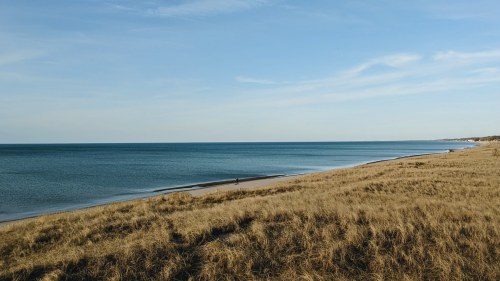The Midwest's Fresh Water Solution

The Great Lakes have always been the foundation of the Midwest economy, but in a world where fresh water is in short supply, this resource is more valuable than ever.
The Midwest is sitting on the resource that will shape the future, and it’s just beginning to think what it can do with it.
No, it’s not oil. Nor iron, steel or farmland, the resources that powered its industrial-era economy.
It’s water. Or rather, fresh water, the useful low-salt variety that is in increasingly short supply around the country and around the world.
California is running out of water: Gov. Jerry Brown has just ordered a 25 percent cut in the state’s water consumption, with more cuts possible in the future, if California even has a future. Oklahoma and Texas are reverting to Dust Bowls. So is northern China. Vast areas of Africa and the Mideast are increasingly parched.
And here we sit, the American Midwest, looking out our collective window on the Great Lakes which, between them, hold no less than 21 percent of all the fresh water in the world. The region, so badly battered by the collapse of its industrial economy, is rich in the world’s most valuable commodity, if only it would take advantage of it.
Some action is happening and some minds are being focused. For a decade now, Milwaukee has worked to make itself the freshwater capital of the world. It set up its Water Council to promote water-related companies there. The University of Wisconsin at Milwaukee already had a Great Lakes Water Institute, set up 40 years ago to do water research, and has just built a new School of Freshwater Sciences. It has hosted water-related delegations from around the world and is gaining a reputation as a global center of freshwater expertise.
Now comes the state of Michigan, in a major report by Grand Valley University and the Michigan Economic Center at Prima Civitas Foundation, outlining what that state is already doing in the water economy and what it must do to fully leverage its vast water resources.
It seems a no-brainer. The world needs water and water expertise, right? And the Midwest has both, OK? But so much remains to be done, for two reasons:
- Most of the Midwest’s attention to its Great Lakes has centered on conservation, not economic use. It goes without saying that conservation is vital: you can’t use what you don’t have. But many of the Lakes’ conservationists seem actively hostile to any exploitation of the water for economic use, apart from tourism.
- There is no regional cooperation at all. Chicago’s political and economic leaders are literally ignorant of what’s going on in Milwaukee, 90 miles away. The four states that share Lake Michigan, for instance, have no joint efforts to use their common resource. Even the new Michigan report doesn’t mention broader regional cooperation.
The Michigan report is written by John Austin, the co-author of the trail-blazing report on the Great Lakes called “The Vital Center” and a long-time leading thinker on the region and its economy. The report lists a myriad of water-related industries, including “water cleaning, measuring, monitoring tools and devices: water and wastewater infrastructure design and building: water efficiency tools and technologies for saving water...and water and water-ecosystem management and services.”
Beyond this, it cites industries that need to be near fresh water, such as farming, many kinds of manufacturing, chemicals, biotech, semiconductors, pharmaceuticals, paper, and food processing. Increasingly, companies that need a reliable source of fresh water will have to come to the Great Lakes to find it.
There’s talk in California and other arid states of simply moving some Great Lakes water westward to maintain their lawns and golf courses. Forget it. First, the cost and engineering involved (pipelines over the Rockies?) makes this unfeasible. More important, the 2008 Great Lakes Compact between the eight Lakes states, plus Ontario and Quebec, requires unanimous approval for any diversion of water outside the Great Lakes watershed. It’s not going to happen.
Obviously, the conservationists have a point: California brought most of its problems on itself through wanton water wastage. The cavalier injection of water into the ground to promote fracking has led to no less than 5,000 earthquakes per year in Oklahoma, all to benefit the oil and gas industry.
But most of the Great Lakes has been brought back from earlier ecological degradation and is probably as clean as it’s ever been. Water levels need watching but seem adequate, and the Compact blocks wholesale diversion.
Indeed, the point of much of the research and manufacturing in Milwaukee and Michigan is to conserve water, not waste it. When companies there talk about “water solutions,” they mean using less water, not more, and making sure that as much water as possible is cleaned and returned to its source.
The Michigan report cites as examples the Whirlpool to make “hyper-efficient” Whirlpool washers and other appliances: the Dow Chemical tools tolls to help manufacturers save water, and the inexpensive water filtering systems made by Cascade Engineering, an auto parts maker.
If this work is going to be done anywhere, it will be done here. Each of the five Great Lakes is among the world’s biggest freshwater lakes. Most of the others are in inaccessible regions, such as Russia’s Lake Baikal (the world’s biggest) and the so-called Great Lakes of Africa. None have the infrastructure or economic potential of the Great Lakes.
We’ve done this before. Much of the earlier Great Lakes’ economy was in ports such as Detroit and Cleveland. Beer and food processing boomed because of the reliable water supply. Further afield, the Midwest used its earlier great resource – farmland—to generate mighty farm implement and food industries.
Today, these legacies aren’t enough to support the Midwest and its people. It needs to generate new industries and to draw in others, including companies based in Texas or California that need water.

